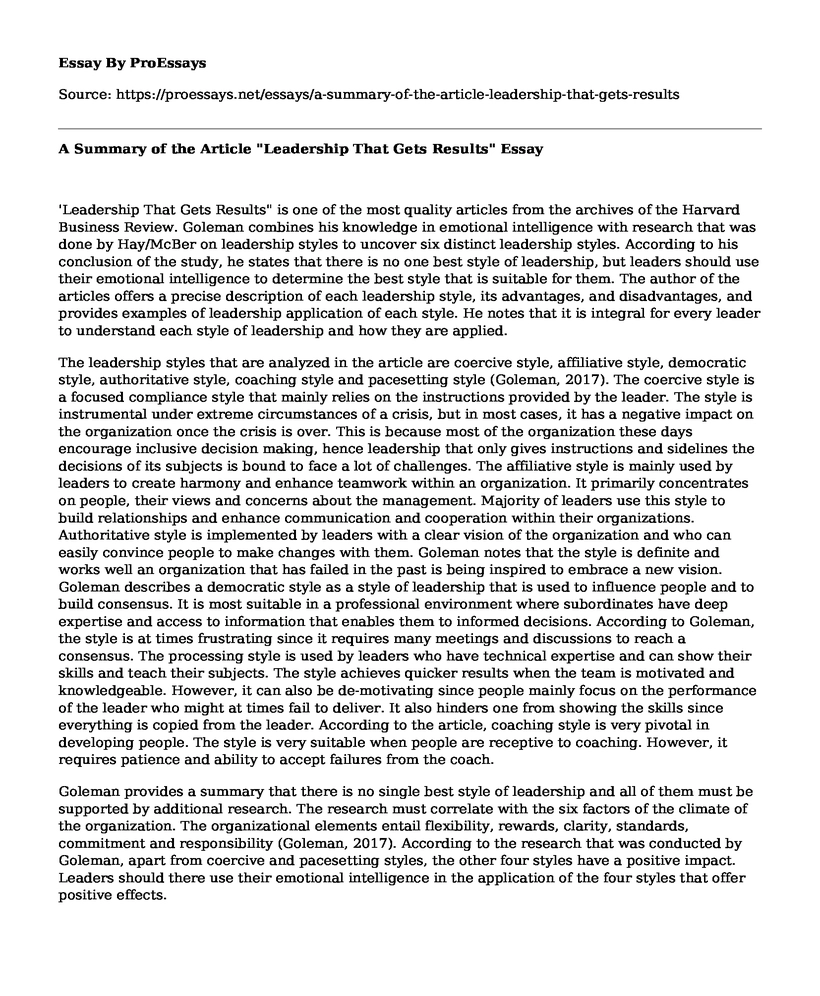'Leadership That Gets Results" is one of the most quality articles from the archives of the Harvard Business Review. Goleman combines his knowledge in emotional intelligence with research that was done by Hay/McBer on leadership styles to uncover six distinct leadership styles. According to his conclusion of the study, he states that there is no one best style of leadership, but leaders should use their emotional intelligence to determine the best style that is suitable for them. The author of the articles offers a precise description of each leadership style, its advantages, and disadvantages, and provides examples of leadership application of each style. He notes that it is integral for every leader to understand each style of leadership and how they are applied.
The leadership styles that are analyzed in the article are coercive style, affiliative style, democratic style, authoritative style, coaching style and pacesetting style (Goleman, 2017). The coercive style is a focused compliance style that mainly relies on the instructions provided by the leader. The style is instrumental under extreme circumstances of a crisis, but in most cases, it has a negative impact on the organization once the crisis is over. This is because most of the organization these days encourage inclusive decision making, hence leadership that only gives instructions and sidelines the decisions of its subjects is bound to face a lot of challenges. The affiliative style is mainly used by leaders to create harmony and enhance teamwork within an organization. It primarily concentrates on people, their views and concerns about the management. Majority of leaders use this style to build relationships and enhance communication and cooperation within their organizations. Authoritative style is implemented by leaders with a clear vision of the organization and who can easily convince people to make changes with them. Goleman notes that the style is definite and works well an organization that has failed in the past is being inspired to embrace a new vision. Goleman describes a democratic style as a style of leadership that is used to influence people and to build consensus. It is most suitable in a professional environment where subordinates have deep expertise and access to information that enables them to informed decisions. According to Goleman, the style is at times frustrating since it requires many meetings and discussions to reach a consensus. The processing style is used by leaders who have technical expertise and can show their skills and teach their subjects. The style achieves quicker results when the team is motivated and knowledgeable. However, it can also be de-motivating since people mainly focus on the performance of the leader who might at times fail to deliver. It also hinders one from showing the skills since everything is copied from the leader. According to the article, coaching style is very pivotal in developing people. The style is very suitable when people are receptive to coaching. However, it requires patience and ability to accept failures from the coach.
Goleman provides a summary that there is no single best style of leadership and all of them must be supported by additional research. The research must correlate with the six factors of the climate of the organization. The organizational elements entail flexibility, rewards, clarity, standards, commitment and responsibility (Goleman, 2017). According to the research that was conducted by Goleman, apart from coercive and pacesetting styles, the other four styles have a positive impact. Leaders should there use their emotional intelligence in the application of the four styles that offer positive effects.
Reference
Goleman, D. (2017). Leadership That Gets Results (Harvard Business Review Classics). Harvard Business Press.
Cite this page
A Summary of the Article "Leadership That Gets Results". (2022, Mar 29). Retrieved from https://proessays.net/essays/a-summary-of-the-article-leadership-that-gets-results
If you are the original author of this essay and no longer wish to have it published on the ProEssays website, please click below to request its removal:
- Consumer Problem Recognition Essay
- Transformational Leadership Paper Example
- Paper Example on Gender and Leadership in Healthcare Administration
- Project Procurement Paper Example
- Prudent Decision-Making Paper Example
- Essay Example on Live Life With No Regrets: Make Conscious Choices
- Free Essay Sample on Global Business Strategies: Achieving Global Competitiveness







